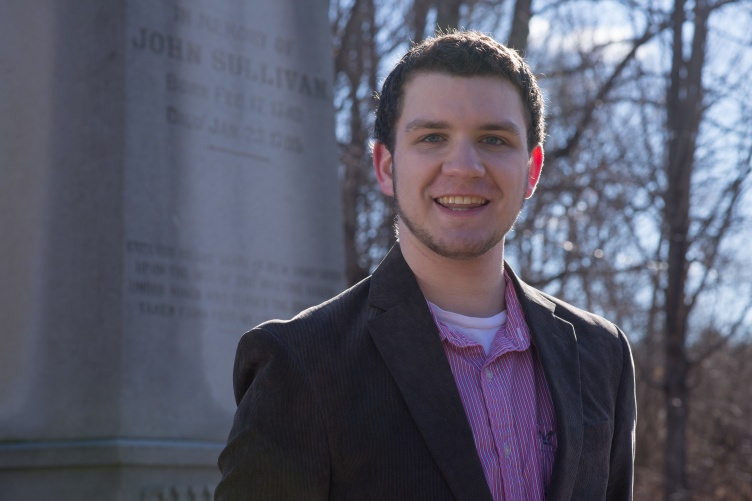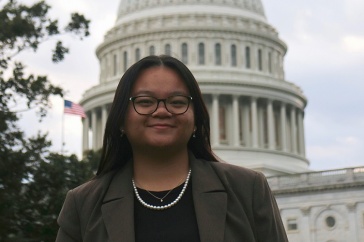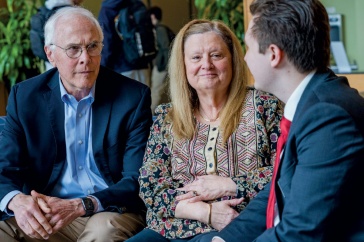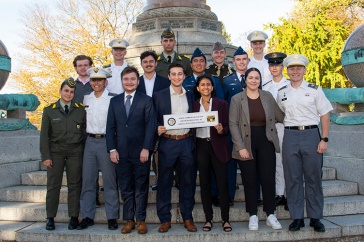
Gabe Hoffman '17 describes studying history as "an active, struggling, getting-down-and-dirty, going-back-and-forth kind of a process.”
What do history and human resources (HR) have in common? More than you might expect, explains Gabe Hoffman ’17, a history major who is setting his sights on an eventual career in HR.
Hoffman’s path to a major in history was not a direct one. He started at UNH planning to pursue psychology and economics and to eventually become a lawyer.
“After a month,” he explains, “I looked at what I was doing with my free time, and I thought that might be a better indicator of what I should be doing with my academic time.”
In reality, Hoffman says, “I was spending all of my free time listening to history podcasts or reading texts … or talking to people about history.”
Hoffman’s decision to come to UNH was a bit more straightforward than his choice of majors: He always had good feelings about the university since his parents met here in Huddleston Hall while they were students. Then, he says, there was the long list of opportunities available at UNH, both in the classroom and in terms of student activities.
“I applied early admission; I got in; I didn’t apply anywhere else,” he says. “I very much owned my decision.”
He also has no doubts about his decision to major in history.
“The level of the department is really outstanding,” he says. “I’m always blown away by the level of the professors … It’s one of the gems of the university.”
Studying history is “a much more active process than I think most even well-educated people understand,” he says, adding it “is not a re-telling or anything close. It is an active, struggling, getting-down-and-dirty, going-back-and-forth kind of a process.”
Being a history student during this year’s first-in-the-nation presidential primary, Hoffman says, made the process “feel more real, because I think a lot of people get disenchanted with the system and say ‘Oh, these people are politicians’ and use that with a very negative connotation.” Meeting presidential candidates and local and state officials who might be future candidates “makes me feel less skeptical of our system,” he says.
That experience isn’t too far removed from Hoffman’s earliest history-related memory, at about 10 years old, watching television with his grandparents as the votes were being tallied during the Bush-Kerry presidential election. He remembers that, for him, it wasn’t about being for or against a candidate but realizing “there was history in the moment,” he says.
When he assisted with the Democratic presidential debate at UNH, Hoffman’s love of history and his role as speaker of the senate in UNH’s student government intersected.
At the debate he was working “with some of the biggest officials in the country ... But, to be honest, I think I still prefer working with the student senators,” he says, adding, “what I like most is to really be open … I’m very interested in just hearing different opinions.”
When asked why people should care about American history, Hoffman immediately questions why they should not care: “If you’re an engineer, it’s useful to know the history of engineering; if you’re in business, it’s useful to know how business has changed, how high taxes were on the top 1 percent back then and how high they are now … that’s history of finance, and that’s also history of America,” he says.
With one year remaining before graduation, Hoffman is thinking about the future. He plans to pursue a career in HR that will incorporate his history studies and his experiences in student government.
In HR, he says, “there is time for a back and forth, time for a synthesis … I want to take all the information before I reach a conclusion, and I think that history does that better than any other subject, so I’m by no means leaving history behind when I go into the world; I’m just taking it in a different way, and I think that speaks to the fact that history is applicable in more ways than just learning dates and numbers.”
-
Written By:
Jennifer Saunders | Communications and Public Affairs | jennifer.saunders@unh.edu | 603-862-3585
-
Compiled By:
Valerie Lester | Communications and Public Affairs | valerie.lester@unh.edu | (603) 862-2632



















































